Text
How people think my triad works:
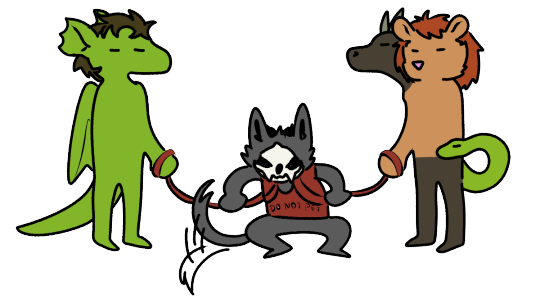
How my triad actually works:
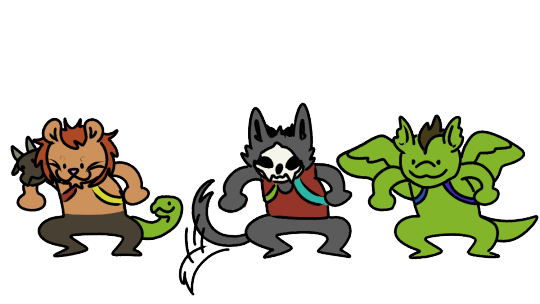
#💕#rated G#screen reader friendly#that's us!! (literally this is an actual drawing of me in my triad drawn by one of my partners)
46 notes
·
View notes
Text
This survey is off to a good start! Some observations and fixes as it enters day three:
The survey received 300 responses within its first 24 hours, wow! The response to the survey itself has been overwhelmingly positive, and the stories shared in it are wonderful. This is the first formally-designed, in-depth survey of these experiences, so I expected it to be small, short, and just a starting place, but it's revealing so much more. Some responses bring up aspects of the scope of these experiences that this survey's questions didn't get into, so they would be great to get into in later surveys.
I found and fixed one glitch. (Okay, Dragons found it, and my boyfriend Page fixed it. Thanks!) If you got an error when you tried to write a list of your other alterhuman identities, now you can edit your survey response to write what you wanted in that field.
One respondent just reported that part of the form was cut off when they viewed it on their mobile device. If you reach the question about therapies and can't see the option to answer "it helped," try editing your response on a device with a larger screen. I'm going to look into if there's a way to fix it, or a work-around for folks who don't have another device. Will it let you tap and slide to scroll to the side?
One respondent pointed out that a question about certain other physical conditions needed to have an option to say intersex, and that's right, so I added that! Adding an option to a survey this late is bad and to be avoided, because the first few hundred respondents didn't have that option, so my data about that answer will be incomplete, but leaving it out would have been a real mistake. Intersex inclusion is important. If you responded already and wanted that option too, I hope you'll edit your response.
A bias emerged that nearly everyone who chose to take this survey are folks who experience these sensations. That means one thing this survey won't be able to tell us is how common these sensations are in alterhuman communities. Many therianthropes and otherkin don't have these experiences, and I want to hear from them too. That won't eliminate the survey's bias, but nonhuman phantom limbs aren't a required or definitive aspect of these identities.
Surveys of alterhuman communities get nearly all of their responses from people in their teens or twenties, even though our communities have a wide age range. The younger folks who started the therianthrope and otherkin communities in the 1990s were in their teens or twenties back then, so they're around their fifties now. They're still therians and otherkin, they just spend their free time in different places. The age bias in surveys is because of where the surveys get shared. If you know any older therians, otherkin, alterhumans, or nonhumans-- even if they different use words for it-- who would be interested in this survey, please tell them about it, so that it will show a more realistic age distribution.
Shout-out to the reblogger who said they'd wait to fill out the survey for when they turn 18 in a few weeks. Thanks for respecting ethical survey standards so carefully, and happy birthday!
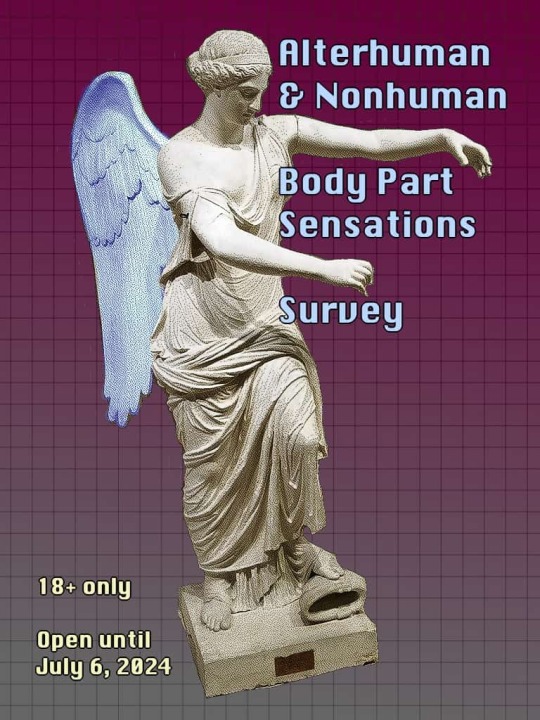
The purpose of this survey is to collect data about the experiences of people who feel sensations of nonhuman body parts, for example, wings or a tail. Some call these supernumerary phantom limbs, phantom shifts, otherlimbs, or astral limbs, though you may have other preferences for the words you use for your own experiences. If you haven't had those experiences, you can participate in this survey too. This survey was made for people who call themselves otherkin, therianthrope, furry, or any other potentially alterhuman or nonhuman identity. If you don't describe yourself with any of those words, you can participate in this survey too.
The survey will take you about 6 to 15 minutes. Everyone age 18 and up is welcome to fill out the survey at the below link, until it closes on July 6, 2024:
Survey Link
Who is running this survey and why: The person running this survey is Orion Scribner (they/them), an otherkin/therianthrope who has been making projects about these communities since 2005. I will use the results in my panel at an Internet-based convention later this year (OtherCon 2024), and in other future research projects.
466 notes
·
View notes
Text

The purpose of this survey is to collect data about the experiences of people who feel sensations of nonhuman body parts, for example, wings or a tail. Some call these supernumerary phantom limbs, phantom shifts, otherlimbs, or astral limbs, though you may have other preferences for the words you use for your own experiences. If you haven't had those experiences, you can participate in this survey too. This survey was made for people who call themselves otherkin, therianthrope, furry, or any other potentially alterhuman or nonhuman identity. If you don't describe yourself with any of those words, you can participate in this survey too.
The survey will take you about 6 to 15 minutes. Everyone age 18 and up is welcome to fill out the survey at the below link, until it closes on July 6, 2024:
Survey Link
Who is running this survey and why: The person running this survey is Orion Scribner (they/them), an otherkin/therianthrope who has been making projects about these communities since 2005. I will use the results in my panel at an Internet-based convention later this year (OtherCon 2024), and in other future research projects.
#otherkin#nonhuman#alterhuman#therian#phantom limbs#therianthropy#therianthrope#survey#please reblog and tell your friends about it if they don't use Tumblr... it will only be open for a little more than 2 months!#screen reader friendly#rated PG-13
466 notes
·
View notes
Text
“When I was in college, a teacher once said that all women live by a ‘rape schedule.’ I was baffled by the term, but as she went on to explain, I got really freaked out. Because I realized that I knew exactly what she was talking about. And you do too. Because of their constant fear of rape (conscious or not), women do things throughout the day to protect themselves. Whether it’s carrying our keys in our hands as we walk home, locking our car doors as soon as we get in, or not walking down certain streets, we take precautions. While taking precautions is certainly not a bad idea, the fact that certain things women do are so ingrained into our daily routines is truly disturbing. It’s essentially like living in a prison – all the time. We can’t assume that we’re safe anywhere: not on the streets, not in our homes. And we’re so used to feeling unsafe that we don’t even see that there’s something seriously fucked up about it.”
— Jessica Valenti, Full Frontal Feminism
#rated PG-13#posts that i did not create#originally posted by queer-feminist-quotes on March 2 2015#swear words#content warning#sexual assault#rape#rape culture#sexual abuse#queue#sex education#i tag thoroughly so if you don't want to see posts like this from my blog you can blacklist the tags 'sex education' or 'sexual assault'#relevant for women whether cisgender or transgender or intersex
45K notes
·
View notes
Video
youtube
GET INFO ON STIs for TRANS MEN!
PART 1 (Gonorrhea, Chlamydia, Syphillis):
https://www.youtube.com/watch?v=FM_10smu7Dk
PART 2 (Herpes, HPV, HIV/AIDS):
https://www.youtube.com/watch?v=W8H2nr9ab2Y
#rated PG-13#sexually transmitted infections#video#sex education#safer sex#sex organs mention#gonorrhea#chlamydia#syphilis#herpes#HPV#HIV AIDS#relevant for transgender men and trans masculine nonbinary people and others on the female to male spectrum#if you visit the video directly on Youtube the info box under it has links for skipping to a section and external links to more sources#if you don't want to see this content from my blog: i always tag thoroughly so you can blacklist the tag 'sex education'#posted to Tumblr on May 7 2016 by ChaseRoss; nothing explicit is shown; the video just has Chase's face talking and lists of symptoms
398 notes
·
View notes
Photo

“my history books lied to me. they told me i didn’t exist.” a quote from alta in the special lesbian issue of big mama rag vol. 1 no. 5, october 1973
10K notes
·
View notes
Text
Some basics about alterhumans, otherkin, and therianthropes
Alterhuman is not another word for nonhuman. It’s not another word for otherkin, either. Alterhuman is an umbrella term for therianthropes, otherkin, nonhumans, and more. It can also be for some who do identify as human, just in some unusual ways. The word alterhuman is short for alternatively human. It was coined by Lio of the Crossroads System in 2014. Its purpose was so all of these kinds could unite under a word, without erasing what makes each one distinct.
The otherkin and therianthrope communities started without any relation to each other. The word otherkin was coined in the year 1990 in the Elfkind Digest mailing list. Its participants were elves, dragons, dwarves, wolves, and more. That’s where the otherkin community started.
Elsewhere, the therianthrope community started in 1993, in an internet group for fans of werewolf stories, alt.horror.werewolves. The participants started talking about how they related to those stories. Therianthropes are often kinds of animals that live on Earth, but not all of them are.
Later, in the late 1990s and 2000s, the communities of otherkin and therianthropes started to mingle because of what they have in common with each other. The two still exist side by side, with their own distinct qualities, and so do many other sorts of alterhumans.
460 notes
·
View notes
Text
On Dentists
So I can’t brush my teeth. Like, it’s the worst kind of hell. I went to the dentist for a cleaning today and I told the hygienist this, and she was wonderfully helpful.
There are some incredibly soft toothbrushes available- namely, post-surgical brushes. Running them under hot water makes them even softer.
She told me that you don’t really need to use toothpaste- it’s mostly marketing. The foam gets to me, so that is really reassuring.
She gave me two particularly soft brushes and some xylitol gum. Trident is a market brand of xylitol gum, which helps with your teeth and can make your breath smell better.
The whole purpose of brushing is to disrupt plaque buildup. You don’t need to brush twice a day, every day with toothpaste if you brush correctly- little circles, focusing on near the gums (where most plaque builds up). So if you’re having a bad sensory day and can’t brush at all, it’s not the end of the world.
Hell, you don’t even need a toothbrush if even the post-surgical ones are too harsh. Going over your teeth with the same motions using a washcloth is enough.
She wants to find a fluoride rinse that has a taste I can stand (peppermint is the only mint I can stand) but she’s not particularly worried about it.
I go to Dr. Barr in Chicago. If you can get to the State St. Macy’s, his office is nearby. He’s very kind and patient and really understanding of my needs as an autistic person. The hygienist, I don’t know her name, announced everything she was going to do before she did it, and stopped frequently to see how I was doing.
This is really the only positive dentist I’ve ever had- past dentists have been too rough and not bothered to help find ways I can actually brush.
Basically this is a glowing recommendation for Dr. Barr’s office if you’re autistic, afraid of dentists, or have sensory needs. This is a recommendation even if you don’t have any of those things.
#posts that i did not create#posted on November 23 2015 by Autistic-Pyro#to my neurodiverse readers: if you have sensory challenges that make it difficult for you to tolerate brushing your teeth#then you may find other helpful tips in the reblogs and comments#dental health#teeth#health#neurodiversity#rated G#screen reader friendly#queue
99K notes
·
View notes
Note
Sorry if you're asked this a lot, but do you have any good sources to read about theriantropy? Especially off Tumblr? Im trying to reconnect with my therian identity and it's been a while since I've done any reading so I have no idea where to start lol. Thank you!
Here's a list on some stuff where you can read about therianthropy and therian experiences. This isn't the end-all be-all to what's out there, and some things in this may be outdated but still worth a gander:
Alterhuman Archive's therianthropy section. An archive with 230~ writings by therians or otherwise about therianthropy. Don't be afraid to poke around the websites or blogs where these writings are linked from, either!
Radiant Obscurities. A project dedicated to showcasing writings about personal animality (especially those of more uncommon or rare theriotypes.)
Project Shift. An older information and resource site about therianthropy. Some things may be very out of date, but it's still worth looking into-- just keep that in mind.
WereLibrary. An archive dedicated specifically to writings about therianthropy, with 84 writings.
I also recommend my partner system House of Chimeras' Therian Timeline ebook. I know there's more out there too-- check the notes on this post to see if folks have added in their own recommendations!
115 notes
·
View notes
Text
Living as a Fictive: How to Find, Create, and Broaden Your Identity, With and Without Canon
Here is the script of my Othercon 2023 panel. The paragraph I wrote to describe it is as follows:
A lecture followed by questions and discussion about being a fictive trying to find and expand your identity. How to connect with not only your source, but the world around you, and how to work on becoming who and what you want to be without canon's constraints.
Introduction
Greetings, assembled people, creatures, and beings of Othercon. Welcome. As you likely know, this is a panel about living as a fictive, and forming an identity around, or perhaps despite, that. I welcome anyone to listen, however, as Othercon is a place to not only learn about yourself, but to learn about others and to interact with the community. Regardless, I ask that you hold your questions until the end, at which point there will be a dedicated section of time for them. I cannot answer questions effectively during the panel, as I am both easily distracted and long-winded, which is a recipe for going overtime and off-script.
A note on terminology before we begin: I am aware that there are multiple words that mean the same or similar things to the word “fictive.” For simplicity’s sake, I will just be saying “fictive” for the duration of this panel, as that is my lived experience and the word I feel most comfortable using. Additionally, I may refer to other members of a system as “headmates”--again, I am aware that there are many words for this, but I will generally use this one as it is fairly widespread and I use it for my own system. If, during the Q&A, you have a different word you would rather I use for your system members when referring to them, you need only ask, and I will adjust my language accordingly. For now, however, “headmate” is the word I will be moving forward with.
That aside, welcome. A brief introduction: my name is Goratrix. I am a vampire, a fictive from the tabletop role-playing game Vampire: the Masquerade. I am one of many canon characters—characters pre-created for game masters to use in the games they run for their players as they see fit, with some pre-written lore to help establish both the character and the setting. When it comes to this world, I have been here since August of 2021, coming into existence during Othercon itself, in the midst of a panel that convinced my system that it would not be so bad to have me around. (Thank you very much to Pale, who ran the panel.) Last year, during Othercon 2022, I ran a panel about living with having a “problematic” fiction-based identity—the script and recording for that are both available for your perusal if you would like. And, if you are wondering: yes, I always talk like this. You get used to it.
The Why of Identity-Building
Now, the topic at hand: being a fictive can be a confusing and lonely thing. We have much in common with fictionkind, but there is a crucial difference: while someone who is fictionkind has an identity and life outside of that fiction-based identity, in the very beginning, fictives typically do not. For most of us, the experience is rather like being plucked from your life and placed into the head of someone else—in my case, an at-the-time college student—with no understanding or awareness of where you are, what is going on, why, or, the worst question of all, what you are supposed to do now.
Take a breath, let it out slowly. We will figure this out together. It is a journey, yes, but it is uniquely yours, and the advantage to that is that it’s quite difficult to get wrong.
In short, my recommendation is this: understand yourself in the context of either canon or canon-divergent noemata, grow as comfortable as you can with that, and then expand outwards. Find or forge new aspects to your identity, find new interests and hobbies, participate in things you never would or could have back in-source. Engagement with the outside world is key to not feeling lost. If you lock yourself up in the identity that has been handed to you, if you insist upon remaining stagnant, as you were when you formed, you are, more often than not, setting yourself up to be miserable. This is not an accusation: I, and many of my headmates, attempted the same thing, and only began to enjoy ourselves once we started reaching out and opening up to the world and people around us.
It’s infuriating to realize that it works, but it really does.
It is, ultimately, your choice whether or not you want to grow beyond what has been set out for you, beyond what you are and were back in-source. The rest of this panel will be moving forward with the assumption that you are choosing to do so, or at least, that you are willing to listen to how that might be done while considering it yourself. Personally, I do not see much harm in personal growth and development, even if it is “out of character” or outside the bounds of what others would consider to be “canon you.” You are wholly fictional no longer, and should not let the bounds of fiction confine you. Do not let yourself be trapped by others’ expectations of you: if they want to interact with a wholly canon-compliant version of you, they should try roleplaying. You owe no one any part of your identity, and anyone who tries to box you in should be ashamed.
By all means, use canon, or your noemata—your memories—as an anchor if you so desire. Many fictives find this comforting. It is your point of origination, your source, where you are from: it is perfectly reasonable that you would want to keep that as a core part of you. I am not suggesting casting off canon unless that is what you want to do, and that is your choice. If you choose to do so, I would advise doing so slowly, in pace with you picking up other aspects of your identity if you feel yourself lacking, for fear of leaving yourself so empty that you do not know what to latch onto. Once again, however, that is your choice: I trust that you will do what you think is best.
Now, identity-building when you have found yourself in a strange world, sharing a head with strange people, can be quite difficult, especially if you have no aspects of identity outside of your source. I have talked about why you may want to grow beyond that, become something else or more. We now reach the how.
Step One: In Context
Older and more established fictives may be able to skip this step, as chances are, you have been doing it already. Many newer fictives also embark on this part of the journey, but not all, so I will walk you through it. The first step of broadening your identity, unless you are choosing to cast off your source completely and immediately, is to do so in context of your source, whether that be canon or your version of it. Doing this will help you flesh yourself out, if you feel it is needed—ask anyone with a fiction-based identity, and most will tell you that engaging with source is an excellent way to connect to the identity. You may remember pieces of your history, things you like, skills you had or may even still have—there is often a wealth of identity to be drawn from your source if you go digging. This may not work for everyone, but it does for many, so I believe it is usually worth a shot. At the very least, doing this digging and engaging with your source lets you get used to the idea and process of identity broadening and exploration in a safer, more comfortable way—your source generally will feel less like a frontier and more like dipping your toes back into the pool.
My first recommendation of this is just to engage with your source—watch it, read it, play it, whatever lets you interact. Most of all, I recommend writing about it. Anything you remember directly—any noemata you have—even things you “just know” without a direct memory. Write about your feelings on it, the people in it, the things you did and the events you witnessed. Writing helps you work through your feelings on a topic in a way that lets you reference them again later. Maybe you turn it into a post for your blog or website, maybe it becomes an essay, maybe it is simply a journal entry for you and you alone. Whatever you decide, I highly encourage that you engage with, or at least think about, your source, and write about it.
Personally, I worked out many of my apparent contradictions and issues with myself by simply going, step-by-step, through the things that bothered me. My early writings on the Fictionkind Dreamwidth detail the atrocities I committed in-source and why, what on Earth my reasoning was. If I had not done this, I do not know if I would have ever reconciled what I was supposed to be with who I was, and who I had to become to live with myself once I had exited the context of the harsh and cruel world I came from. Take your time with this; do not rush. You are not in a race. The time will pass regardless, so you might as well let it pass pleasantly and with little pressure.
My next recommendation is to seek out noemata in general. For those unfamiliar with the word: noemata, singular noema, describes any kind of source memory you may have, whether that be a specific moment, a scene, a smell, a sense, or ‘just knowing’ a fact without any moments or instances to back it up. The two best ways to do this that I know of are to engage with canon (to prompt your mind to “remember” what it sees, although this can produce false memories) or to do as many (usually mundane) things as you can in the hopes that you will trip a memory trigger. Neither method is perfect, and there are other tips for getting and finding noemata out there—if anyone listening has resources for that, please, feel free to link them in the chat.
Finally, I would recommend reaching out to and talking to sourcemates, whether or not they share your exact canon. I know many fictives are not comfortable with sourcemates, nevermind doubles, but if you are, I cannot stress enough how much better you can feel after talking to them if you get along. I do not know where I would be today without my boyfriend Chaiya in the Treehouse system—in our shared early days of being fictives, that summer and autumn of 2021, we were lost and untethered, and latched onto each other in an attempt to anchor ourselves. We are much stronger for having had each other, and are extremely close, and I do not see that ever fading. Chaiya helped me work through my issues with my identity, smooth out the wrinkles and accept who I am over who I “should be,” and vice versa. Without Chaiya, I doubt I would have ever engaged with the alterhuman community directly, so my thanks goes out to him—without him, this panel would not exist!
Sourcemates are extremely helpful because they understand. Many of them know the context of the world, so you do not have to provide it. They know what happened, who everyone is—they understand why you may feel the way you do about things, why topics might be complicated, et cetera. They are less likely to have to ask basic questions, and together, you may discover things about yourselves and each other. Doubles—fictives of the same character—are even more understanding in many ways, although I understand the possible distress of meeting one. I never have, I doubt I ever will—my friends and I are not terribly popular characters in the grand scheme of Vampire: the Masquerade or the broader World of Darkness—but my head- and sourcemate Sascha Vykos has. She is also in the Treehouse system and goes by the name Ashena, separating herself somewhat from the name of Sascha Vykos—but, still, she and Sascha are the same in many ways. They understand each other implicitly, often without ever having to say anything on a topic other than to bring it up, and they understand. There is a level of identity-diving and forming that can be reached only by someone who understands you wholly and completely, and a similar double is a good resource for that, if you can find one and if you are comfortable with it. If you cannot or are not: that’s fine. It is by no means a requirement, simply a recommendation.
Step Two: Things to Do
Beyond engaging with your source material, to expand your identity, you will need to engage in other activities. Form an interest in something, get a hobby, give yourself some enrichment—or, in a more joking manner, roll a pumpkin full of meat around your enclosure. Now, while meat pumpkins may be an appropriate form of engagement for some more inhuman fictives, for the rest of us, we would get bored quite quickly, and need to find other activities to occupy us.
Why do activities? Why have an interest? Well, as a living (at least at the moment) and thinking creature, you need something to think about. And thinking about yourself and your source will only last you so long; eventually, the thoughts will become mundane and well-tread to you, and to maintain a level of activity and happiness, you will need something to engage your mind and that thing is typically going to be something you enjoy, often an activity. The idea is to give you something that you want to front or co-front to do or be present for, so that you are around in order to experience the world, form likes and dislikes, and grow as a person. This is the next step, and you can take it as quickly or as slowly as you’d like.
Expose yourself to activities, shows, songs, anything you’d like at a speed that is comfortable to you. A good starting point is to go along with what a headmate is doing and try to get into their interests, and if it doesn’t work out, that’s fine. There is no harm in trying something only to decide that it is not for you. A headmate’s activity or interest is fairly safe since, chances are, the system was going to be doing that regardless, and all you are spending is your own engagement time, which you wanted to be doing anyway.
Another good starting point is anything that you were interested in back in-source, especially if it still speaks to you. If you liked to read novels, listen to a type of music, create a certain kind of art—that might still be a good outlet for you, and you may still enjoy it. You might not. Key to this is remembering that it is okay if you don’t still like something—people grow and change over time, and not all interests last forever. Perhaps they will return in the future. When it comes to skills you used to have, however, beware: many fictives lose their skills in the transfer over to the system and need to re-develop them, and therefore, engaging with old skill-based interests may be incredibly frustrating, especially at first, as you may be back at beginner level despite knowing that you used to be better. I have had this experience with many of my own skills, particularly language learning—be kind to yourself, and remind yourself that, physically, you have a different brain than you once did (if you had one at all—robots or spirits may have had some other analog) and it may not know how to do what your old one did. You will need to teach it anew—and for some, that is a worthwhile endeavor, and for others, it is too painful and frustrating. Do what feels best to you, not what stresses you out.
On the flip side of that, do not limit yourself to hobbies or interests that “match” or “make sense” for who your source set you out to be—if something intrigues you, take a look. Pick it up, give it a try. There is no right and wrong when it comes to things you like or enjoy—if you like it, you like it! Do not let what others might think of you or your “image” get in the way of enjoying something genuinely. This is for you, no one else.
That being said, I encourage you to seek out community. Make friends. Find more reasons to front and to care about the world you have found yourself in. Perhaps it is similar to the one you come from, or perhaps it is very different—but you are here now, and I highly recommend that you try to make the most of it. I have found that friends, even just a few, make everything worth it, and that they make my darker days much easier to bear, as well as making my better days even more enjoyable than they already were.
As for you, nonhuman fictives, do not fear, I have not forgotten you. While you can pick up the same interests and hobbies as your human- and human-adjacent headmates just fine in most cases, activities not suited to your species might not interest you. My recommendation is to look for alterhuman lists and guides of suggested activities for your species or a similar one—the otherkin and therian communities are extremely good at this, and just posting in a community asking for suggestions is likely to get you quite a few. And, if all else fails, go back to square one: meat pumpkin.
Now, I must confess that my recommendations for activities and engaging in yourself and the world around you focus almost entirely on fronting or co-fronting and engaging with the outside world. Some systems, I know, have very detailed and rich innerworlds, where headmates can perform tasks, do activities, and otherwise lead complete, complex, and fulfilling lives. If this can substitute for you and make you feel fulfilled, I see no reason to limit yourself to engaging strictly with the world outside of your own mind—but I am not knowledgeable on this topic, as my own system’s innerworld is rudimentary at best, a simulation designed to let us visualize our existence rather than an actual complex and detailed place. When it comes to this, I will have to leave it in the hands of systems who experience it.
Step Three: Becoming
This is the most challenging step by far, and for many, it is not necessary. Perhaps you find yourself happy with your identity—perhaps you are not perfect, but no one is, and you just want to continue to live your life, experience the world, and grow and change “as you will,” letting yourself be shaped by your experiences like most people do. Fantastic! That is my recommended approach in most cases, and I encourage you to continue on that path. Keep experiencing, keep growing, keep talking with people, picking up interests, doing activities, and making things. Write, love, live, and have fun.
But for some, particularly those with more “problematic” source material, that may not be enough. In some cases, a fictive, usually of a villain, will form, and either immediately or eventually realize that they do not want to be who they are. They do not want to keep these personality traits, they cannot stand the things they have done—or perhaps they are simply sick of it, and wish to change themselves.
For those of you in this camp: first, my condolences. I have been in and out of this mindset, and have several headmates that exist within it. This is a long, difficult process, and as frustrating and counterproductive as it is to hear, you cannot get through this if the core of your being is self-hatred. You must be willing to accept or forgive yourself for being that way, or for doing what you did. You must be willing to accept that there is no going back now, only moving forward, and accept that you can only change the future, not the past.
However, also remember that you do not owe anyone anything. Do not let anyone tell you what you “must” change—you do not have to stop. You do not have to change anything, although I would advise keeping behavior most would consider repulsive to yourself, for system accountability if nothing else. You are not obligated to change the “bad” parts of yourself—if you wish to, that should be your decision, you should do it because you want to. Never change because someone else is pressuring you. Never. That is a lesson I have had to learn the hard way, primarily back in source, and if you listen to nothing else I say today, listen when I tell you that bowing to those who pressure you to change who you are leads only to strife. A thousand years I suffered from that: do not make my mistake. Learn from me.
Now. Let us say you want to change something about yourself in this way—a key trait, a streak of cruelty, something along those lines. How?
You will hate it, but—refer back to step two. Engage with the world around you. Make friends. Care about people. Let yourself love and be loved, and do not stop people when they try to care about you. Let the running waters of time and the world smooth out your rough points, wear away your sharp edges. Time will let you become who you want to be if you allow it.
Think about this, too, if you want to do something about it: think about what you would rather be like. Who around you has those traits? How do they act when they show them? What do they do that you admire so much that you want to be that way, either instead or in addition to the way that you are? You may have heard the phrase “fake it until you make it” before, but in this case, it is very true. Identity is a fluid thing sometimes, although I admit that I find it more fluid than most, due to my borderline personality disorder. You can fool yourself into really being a way without actually being that way—or, at the very least, you will find your mimicry becoming easier and easier, more comfortable, and if it is something you like, then fantastic. You have succeeded. How you act is what matters, not the way you behave.
Remember that changing yourself must, must be an act of self-love, not of self-hatred. You must want to be a new way because you would like it better, not because you despise yourself so much you cannot face yourself in the mirror. You can take your dislike of yourself and turn it around into something positive, but you cannot self-punish your way into being a different person. Not successfully, not happily.
And, again, remember: you are not obligated to change any part of yourself, even if you are “problematic” or even a “bad” person. There are many “bad” personality traits of mine that I do not seek to change because I have accepted and come to terms with them. To change them would be to cease to be the person I am and am comfortable being; there is no reason to change who I am intentionally and directly. I will let the world and my experiences affect me as they will, but that is no different than how most people live their lives. If you choose this path of changing yourself, make sure it is because you want to, not because you feel you have to.
Putting It All Together
All of this advice is nice, but does it work? I like to think so—this reflects my own journey and approach to growth and engagement with the world, as well as that of several of my headmates. Those of you who read my older work or knew me when I first entered the community have likely noticed a significant change in me from my first days—I am less abrasive, less angry, less likely to lash out or snarl at the first hint of provocation. I was desperate, scared, a beast cornered and threatened. Now, I know the world and the community well enough to step up and give a panel, write essays, run a Dreamwidth community—and that was because I let myself learn and grow from my experiences, I let myself pick up interests and make my own friends outside of the system’s pre-existing friends, and I worked on becoming someone more stable, someone I liked. I have lived much of my life in self-loathing, and it is a strange, wonderful feeling to be free of its mire, at least for now.
For another example, my headmate Japheth was fairly distant for two or so years until very recently stepping forward and making friends and engaging in his own interests. It took him some time to write a few angry, lost essays, answer a few prompts, and then stew—and only emerge slowly, piece by piece, as we slowly convinced him to care about other people and the world around us. Only once he began to take an interest in what the system as a whole was up to did we finally see him smile, smile and begin to have fun, and that was worth all of the time it took to get him there, because it was such an improvement over his deep, vast melancholy that he came to us with.
For our system, our main methods of engagement with the world are through making friends (often with fictives in other systems, but not always) and through playing video games. Our game library is vast: different headmates play different games, and even when they share interest in a game, many have different characters or save files from each other. This helps us feel different and feel like we are making our own progress, giving us a reason to front and care about something that is uniquely ours. This is what works for us, but maybe it doesn’t for you. That’s fine; for a thousand systems, there are two and a half thousand ways of making progress.
The goal of this entire process is to help you be happy. The goal is to let you enjoy the life you find yourself in, to be happy with yourself and the situation you are in. If this guide helps you get there, fantastic. If not, but you get there another way, good. What matters is that you one day sit back and realize that you enjoy who you are, where you are, and what you are doing. Adjusting is not always easy, but with time, effort, and support, I know that each and every one of you can do it. Take a breath for me, once more. Tell yourself, please, that you can do this. It is only insurmountable so long as you allow it to loom over you. By breaking it into smaller chunks and individual steps, you can take it once manageable piece at a time until you realize that you have reached a state of contentment. One day, you will get there.
Conclusion
Now, as the lecture part of this panel draws to a close, and we approach the Q&A, I have a couple of notes. First, if you have a question that does not get answered or that you would prefer to discuss privately, you can message me here on Discord, on Tumblr, or even through email any time—just specify that you are looking to talk to Goratrix, and I will be there to get back to you. Second, I would like to open the discussion and Q&A portion with a list of audience-gathered suggestions—what would you recommend to a new or struggling fictive? What activities, interests, shows, games, community spaces? We have extremely varied experiences, I am sure—so drop your suggestions in chat for people to read through. If you have anything for your or a similar source, feel free to suggest that as well.
While that happens, and while people read through those, let us open up the remaining time for questions. I will do my best to answer.
182 notes
·
View notes
Text
2024 QGB Submissions Are Open
Hi everyone -- it's Caroline. I'll be leading the bundle this year while Taylor works to leave Florida. The bundle's submission page is open now:
Please submit your games and other work by May 1. I guarantee submissions will stay open until then. Any questions about anything, please email [email protected].
47 notes
·
View notes
Photo

#rated PG-13#queue#consent#sexual assault prevention#sexual assault#rape#content warning#screen reader friendly
6K notes
·
View notes
Text
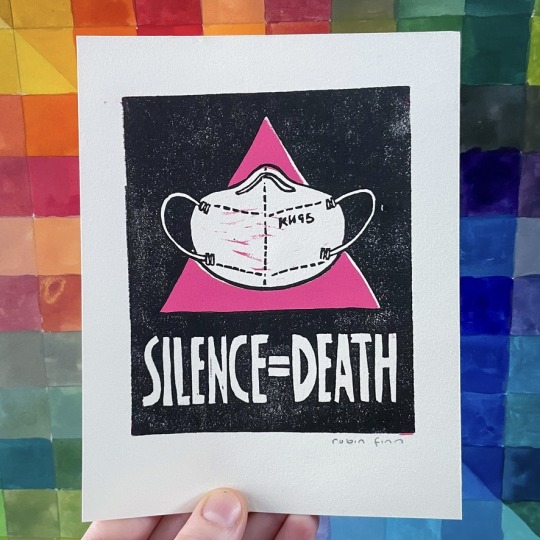

I just listed a limited number of hand printed notecards, plus original prints on my nicest paper paper.
#rated G#COVID-19#COVID 19#COVID19#masking#queer history#HIV AIDS#pink triangle#death#mask#art#posted by the artist FiddleheadFinn on December 3 2023#queue
18 notes
·
View notes
Text
New study: Only 1 percent of transgender youth receiving gender affirming care detransition

A groundbreaking study out of Perth Children's Hospital using innovative methodology determined only 1% of patients receiving GAC detransitioned/desisted, that does not suffer from loss to follow up.
Erin Reed writes:
A groundbreaking study from Perth, Australia, published in JAMA Pediatrics has found that only 1% of transgender youth receiving gender-affirming care at a clinic reidentified with their sex assigned at birth. This is in addition to the 4% who reidentified during the mental health assessment period or earlier and did not proceed with receiving gender-affirming care.
The study, based on 552 young patients from 2014 to 2020, is poised to significantly influence the debate on gender-affirming care due to its unique methodology, which does not suffer from loss to follow-up—the detransition status of 548 patients was successfully determined. It will likely be cited as the most compelling study on low detransition rates in the coming months.
More here.
The original paper here: Reidentification With Birth-Registered Sex in a Western Australian Pediatric Gender Clinic Cohort Blake S. Cavve, Xander Bickendorf, Jack Ball et al.
Photo: SB Arts Media
#rated G#transgender youth#queer youth#queue#transition#puberty blockers#Australia#study#transgender#detransition
30 notes
·
View notes
Text
With the hbomberguy plagiarism video on fire right now I want to share my favorite example of egregious plagiarism.
I’m a marine biologist. Currently getting my PhD. I’ve done a lot of scholarly writing. Many classes I took as an undergraduate had big writing components. I took limnology at one point as an elective. This course had one such big writing assignment.
The professor told us a story. He said he once got a student paper that absolutely blew him away. It was way beyond what he’d expected from the class. This was before we had online tools to check for plagiarism. The paper impressed him so much that he brought it home to show it to his wife. She began reading it and then set it down, looked at him, and said, “Dan, you wrote this.”
This student was dumb enough to not only copy a published paper verbatim, but to copy a paper published by the professor of the class.
AND HE NEARLY GOT AWAY WITH IT.
76K notes
·
View notes
Photo
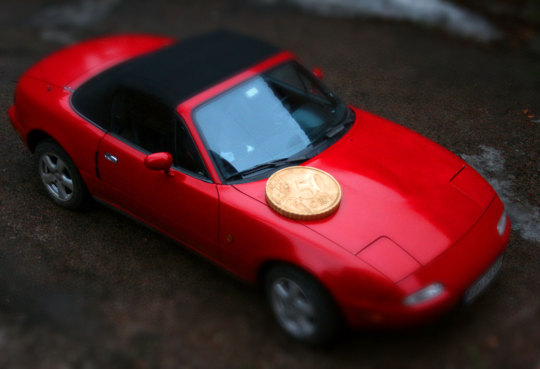



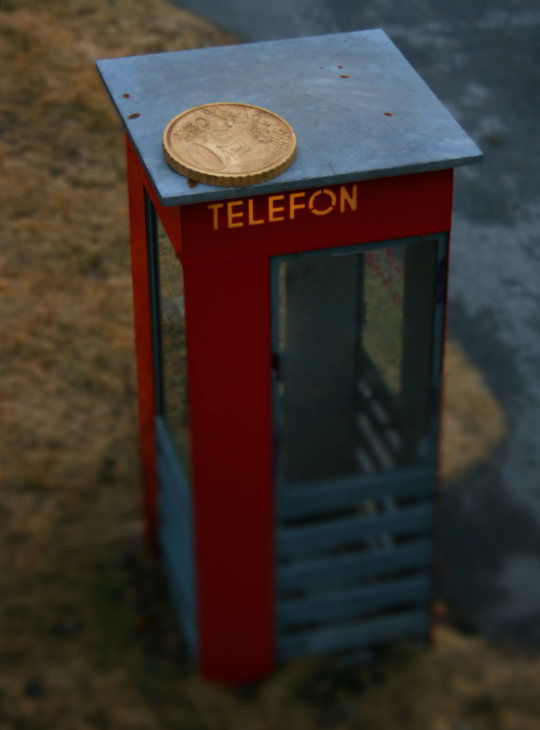
Really Big Coin Skrekkøgle
This is our Really Big Coin. It is big because it makes other things look small when photographed next to it. Actually, it is a 20:1 replica of the EUR 50-cent, you see it being milled out here. We needed to do quite a bit of sanding, lacquering and smudging to obtain the desired look and some climbing to get into required shooting position (you need to get up real high to take good pictures). The result is a short series of photographs, attempting to visually scale down real-sized objects.

Images and text via
#rated G#unreality#not screen reader friendly#April Fool's Day#model#miniature#crafts#scheduled post
329K notes
·
View notes